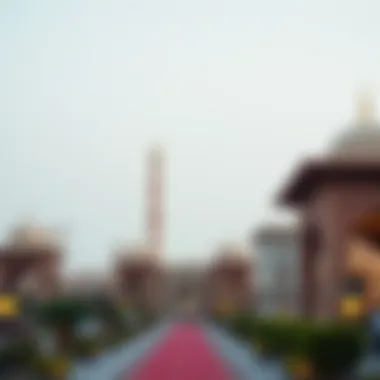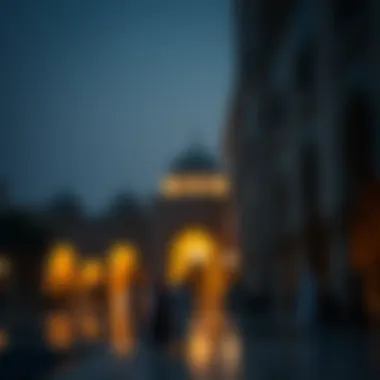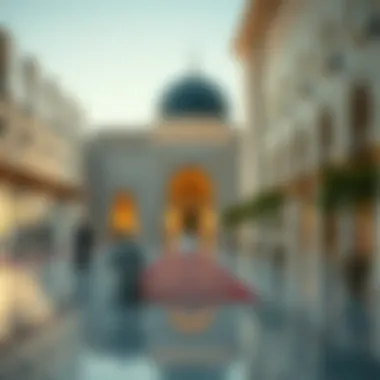Ramadan in the UAE: Insights and Practices for 2023


Intro
Ramadan, a holy month in the Islamic calendar, carries profound significance for many people, especially in the United Arab Emirates. As it approaches each year, it brings with it a wave of anticipation and vibrant expressions of faith. The community bonds become stronger as families and friends come together to share meals and engage in prayer. In the bustling cities and the serene deserts alike, Ramadan transforms daily life.
In 2023, the observance of Ramadan in the UAE is not only about fasting but also involves deeper cultural dynamics and socio-economic influences. Understanding these elements offers valuable insight into how this sacred period affects various facets of life, particularly for expatriates and locals alike. In the following sections, we will explore the customs and rituals that characterize Ramadan in the UAE, the effects on daily routines, and the broader implications for the economy.
Throughout this exploration, we aim to provide a cohesive narrative that highlights both the spirit and the practicalities of Ramadan, ensuring a well-rounded perspective for real estate agents, investors, expatriates, homeowners, and developers interested in navigating this unique time in the Middle East.
Market Trends and Analysis
Current Market Conditions
The economic landscape in the UAE during Ramadan displays distinctive traits influenced by cultural practices. Many businesses experience shifts in their operational hours, with most shops opening later in the day. Restaurants and cafes, for instance, often extend their hours to cater to those breaking their fast, leading to a vibrant night-time economy.
"The economic pulse during Ramadan is dynamic, with certain sectors witnessing significant fluctuations in demand, notably in hospitality and retail."
Moreover, the real estate market can witness an uptick in activity as expatriates often seek temporary housing or adjust their living arrangements. Properties in close proximity to mosques or community centers become particularly attractive. Given the UAE's melting pot of cultures, the Ramadan spirit promotes community events and gatherings that further enrich the local economy. Individuals may find opportunities in services that cater to these communal spaces, strengthening ties within neighborhoods.
Future Predictions and Growth Areas
Looking forward, the influence of Ramadan on the UAE’s economy is poised to evolve further. Urban planners and real estate investors should pay close attention to how the demand for properties might shift post-Ramadan.
Areas that previously thrived due to high footfall during the holy month may see sustained interest throughout the year. Investment in properties that can transform to serve multiple purposes—like community centers or mixed-use developments—may become appealing.
Moreover, as more expatriates experience Ramadan in the UAE, there’s potential for new market segments to emerge, particularly in vacation rentals and family-friendly accommodations. With predictions of increased tourism post-Ramadan, savvy investors should consider how to adapt their portfolios to include spaces that cater not just during Ramadan but also to those coming to experience the cultural richness of the festival.
As we delve deeper into the observance of Ramadan, it will become evident how these trends intertwine with cultural practices, enhancing both everyday life and business strategies in the UAE.
Prelims to Ramadan
Ramadan holds a pivotal role in the cultural and spiritual landscape of the United Arab Emirates, especially in the year 2023. This holy month is not only a time for fasting but acts as a catalyst for a range of social, economic, and spiritual transformations within the community. Understanding the intricacies of Ramadan helps illuminate the ways in which it influences daily life across different segments of society—be it Emiratis, expatriates, or tourists.
The month of Ramadan is steeped in historical significance, dating back to the origins of Islam. Having a grasp of its historical context can enrich one's appreciation for contemporary practices. Why does one fast? What does it signify? This section provides a foundational understanding that enhances the comprehension of various rituals observed during this period. With the fast-paced realities of modern life, grasping the essence of Ramadan is essential for everyone living in, or interacting with, the UAE during this sacred time.
Moreover, Ramadan's religious significance serves as an anchor point in the lives of millions. It inspires community interactions, charitable acts, and family gatherings. Becoming aware of these factors allows individuals and businesses alike to adapt their activities to align with the values promoted during this month.
In this article, readers will gain insights into the various facets of Ramadan— its timing, cultural relevance, and broader implications for both the Emirati population and expatriates residing in the UAE. Consequently, an understanding of these elements not only enhances one’s cultural competence but also facilitates better interpersonal and business relationships.
Historical Context
The historical aspect of Ramadan can be traced back to its inception in the 7th century, as prescribed in Islamic teachings. Muslims regard this month as a time of reflection, spiritual growth, and self-discipline. During this period, the Quran was revealed to the Prophet Muhammad, marking a significant event in Islamic history, which explains the special reverence individuals hold for this month. In the UAE, particularly, the practices surrounding Ramadan have evolved, but the core principles remain unaffected.
The establishment of Islamic traditions began with the gradual acceptance of Ramadan among various tribes and communities. Remnants of these historical practices can still be seen in today’s celebrations, like the communal aspects of Iftar meals that hark back to the community gatherings of old.
Religious Significance
The essence of Ramadan transcends mere fasting; it embodies a profound commitment to faith and spirituality. Fasting from dawn until sunset is a means to attain Taqwa, or piety, which encourages individuals to reflect on their actions and cultivate compassion for those less fortunate. Many individuals express their devotion through increased prayer, reading of the Quran, and participation in acts of charity, further emphasizing the communal nature of this month.
By transforming the way people interact—with an emphasis on kindness and forgiveness—Ramadan helps foster unity among diverse populations in the UAE. The religious aspect drives home a notion of togetherness, with families and friends often coming together for Iftar, the meal to break fast, creating vibrant social gatherings that strengthen bonds between community members.
Collectively, the historical and religious layers of Ramadan contribute significantly toward the understanding of its function in society today.
Ramadan serves as a gentle reminder of the shared values of humanity, resilience, and the importance of community.
By delving into these core elements, the narrative around Ramadan not only becomes richer but also attains relevance for anyone wishing to engage meaningfully with this sacred period.
Ramadan Timing in the UAE
Understanding the timing of Ramadan in the UAE is crucial for both residents and visitors alike. This holy month is not only a time for spiritual reflection and community gatherings but also fundamentally affects daily routines, business operations, and cultural practices. The timing of Ramadan shifts yearly due to its reliance on the lunar calendar. This section offers insights into the specific dates for 2023, the schedule for daily prayers and Iftar, as well as the impact of the lunar calendar on the observance of this sacred month.
Start and End Dates of Ramadan
The beginning of Ramadan in 2023 is anticipated to commence on the evening of Wednesday, March 22, pending the sighting of the crescent moon. This initial sighting marks the start of a month-long fast that concludes with the celebration of Eid al-Fitr. The expected end date for Ramadan is Friday, April 21, but again, this date can vary based on the lunar observance. The Prophet Muhammad emphasized the importance of sighting the moon, stating, "Fast when you see it, and break your fast when you see it." This means that local traditions and practices may slightly differ in emirates.
Daily Prayer and Iftar Times
During Ramadan, the daily schedule undergoes significant alteration. Muslims observe five prayers throughout the day, but particular attention is given to the timings of Fajr and Maghrib.
- Fajr: The pre-dawn prayer marks the start of the fasting period. In 2023, Fajr is expected to be around 4:45 AM, and this is essential as it signifies the time one can eat prior to fasting.
- Maghrib: Following the sunset prayer around 6:45 PM is the moment when the fast is broken. The traditional call to prayer rings out in communities, often followed by large gatherings for Iftar.
To make daily life easier, many mosques provide prayer times through apps or local community bulletins, helping everyone stay aware of the schedule.
Impact of Lunar Calendar


The lunar calendar has an irreplaceable role in determining the timing of Ramadan. Unlike the Gregorian calendar, which is 365 days long, a lunar year consists of about 354 days. This discrepancy causes Ramadan to shift by approximately 10 to 12 days each year. For instance, in 2022, Ramadan began on April 2. Each time it rolls around, it brings unique seasonal experiences, cultural expressions, and weather conditions affecting fasting.
The experience of Ramadan in the UAE, particularly in 2023, can vary dramatically due to this timing shift. In hotter months, the challenge of fasting from dawn until sunset is magnified, whereas cooler months might afford a slightly easier experience. Aside from the physical implications, the timings also encourage social gatherings, shifting businesses to cater to the fasting population. Shopping malls and eateries often adjust their hours to accommodate late-night dining and Iftar meals, creating a bustling atmosphere post-sunset.
In the UAE, Ramadan serves not only as a month for spiritual growth but also for strengthening community bonds and even adjusting the economy to accommodate these significant changes.
Understanding these intricacies allows expatriates, especially, to delve deeper into the social fabric of the UAE during this time, creating a more inclusive experience while respecting cultural values.
Cultural Practices During Ramadan
Cultural practices during Ramadan are a cornerstone of the observance of this holy month in the UAE. These practices not only shape the spiritual experience for Muslims but also have profound social and economic implications. They reflect the deep-rooted traditions that enhance the sense of community and belonging among the population, whether Emirati or expatriate. As the community gears up for Ramadan, it becomes a vivid tapestry of rituals, celebrations, and interactions that resonate through daily life.
Fasting Rituals
Fasting during Ramadan is not just about abstaining from food and drink; it's an act of discipline and reflection. From dawn till sunset, Muslims refrain from eating, supporting a heightened sense of mindfulness and self-discipline. Each day begins with a meal known as Suhoor, taken before dawn, symbolizing the spirit of perseverance.
Once the sun sets, families and friends gather for Iftar, the breaking of the fast. Traditionally, people start with dates and water, adhering to the prophetic tradition, before diving into hearty meals laden with rich flavors. Meals vary greatly from region to region, showcasing local ingredients and flavors. In the UAE, dishes like Harees, Shorbat Adas, and Knafeh often grace the tables, making the evening a culinary feast.
Moreover, the act of fasting fosters empathy for the less fortunate, reminding practitioners of the importance of compassion and generosity. This ritual encourages individuals to develop deeper connections with community members and savor moments of gratitude.
Community Gatherings
During Ramadan, community gatherings take on heightened significance. Neighborhoods come alive with cultural vibrancy as people come together to break bread and share experiences. Public spaces, like parks and community centers, are often transformed into venues for communal Iftar gatherings where everyone can participate, regardless of their background.
These gatherings serve multiple purposes. They not only enhance social bonds but also foster inclusivity, welcoming expatriates and newcomers into the fold. Expatriates, many of whom are eager to embrace local customs, often find these communal events as ideal opportunities to experience the spirit of Ramadan firsthand.
At the heart of these gatherings is the transfer of knowledge and customs from one generation to another. Elders share stories, traditions, and wisdom while younger members learn the true essence of Ramadan - a time for reflection, unity, and gratitude. It is remarkable how these gatherings create an environment where cultural exchanges thrive, often blending traditional Emirati practices with various influences from expatriate communities.
Charitable Activities
Charitable activities during Ramadan underscore the ethos of giving inherent in its observance. As fasting teaches self-restraint and sympathy for those in need, many individuals and organizations ramp up their charitable contributions during this period. It becomes common to see initiatives such as food drives, clothing donations, and fundraising events aiming to support the less fortunate.
One prominent organization committed to charitable work is the UAE Red Crescent. They play a vital role in organizing various humanitarian efforts during Ramadan, catering to both local and international communities. Individuals also take it upon themselves to give back, whether by donating surplus meals after Iftar or volunteering at local nonprofits.
Various mosques throughout the UAE serve as hubs for charity, where funds and donations are collected and distributed to the needy. This collective spirit of giving doesn’t just manifest in monetary contributions; it also includes acts of kindness, providing a helping hand, or offering companionship to those who may feel isolated.
In a nutshell, the charitable aspect of Ramadan is a manifestation of the broader cultural practices in the UAE. It emphasizes the importance of community support while strengthening social fabric and showcasing the generosity and compassion valued by Emirati society.
"During Ramadan, the UAE exemplifies unity through shared traditions, culinary delights, and a commitment to helping others."
Through fasting rituals, community gatherings, and charitable activities, the cultural practices during Ramadan provide not only a personal avenue for reflection but also an opportunity for collective celebration and charitable spirit, uniting individuals and communities in profound ways.
Economic Implications of Ramadan in the UAE
Ramadan, a month of fasting, reflection, and community, holds economic significance that resonates throughout various sectors in the UAE. This period is not merely a spiritual observance but also a vibrant phase that influences consumer habits, business practices, and even the tourism industry. The changes during Ramadan offer insights into the broader dynamics of the UAE's economy, reflecting both the local culture and the global interconnectedness of markets.
Consumer Behavior Changes
During Ramadan, one can observe a notable shift in consumer behavior across the UAE. Generally, spending patterns tend to increase as families prepare for the iftar meals, community gatherings, and festive events. Retailers and supermarkets often see a spike in purchases of food and beverages, as preparation for pre-dawn meals, or suhoor, and evening breaks, or iftar, becomes paramount.
Key factors include:
- Increased spending on food: Families buy ingredients to create lavish iftar meals, leading to promotions and discounts from local supermarkets.
- Emphasis on gifts: Muslims often exchange gifts during Ramadan, further boosting retail sales, especially among electronics and clothing sectors.
- Shift towards healthy offerings: There’s a growing trend for consumers to seek healthier options, prompting stores to stock more organic and nutritious products.
This surge in spending extends to digital marketplaces too, indicating a shift towards e-commerce as consumers seek convenience while observing fasting rituals.
Business Operations
Ramadan brings with it adaptations in business operations across various sectors. Companies commonly adjust their working hours to accommodate the fasting schedule. Many businesses opt for shortened hours, allowing employees to fast without feeling burdened by lengthy workdays. This adaptation has multiple implications on work dynamics and employee productivity.
Important considerations are:
- Flexible working arrangements: Some organizations offer remote work options to help employees manage their fasting alongside work responsibilities.
- Promotional campaigns: Businesses craft specific Ramadan-focused marketing strategies, introducing limited-time offers and special product bundles to entice consumers.
- Employee engagement: Many companies organize events or charity initiatives that align with the spirit of Ramadan, enhancing team morale and community relations.
Adapting to these changes not only supports employees but also strengthens customer relationships, creating brand loyalty embedded in cultural values.
Tourism Impact
Unexpectedly, Ramadan can act as a double-edged sword for the tourism sector in the UAE. On one hand, many tourists may be curious about how Ramadan is observed and wish to experience the rich cultural heritage. On the other hand, the fasting season can lead to reduced activities and tourist engagement, particularly in certain areas.
Factors influencing tourism during Ramadan include:
- Cultural tourism: Many visitors seek to understand the religious practices during this time, with tours and events highlighting local traditions and heritage.
- Iftar experiences: Hotels and restaurants often create special iftar offerings, which can attract tourists looking to dive into the culinary delights specific to the region.
- Reduced nightlife activities: The fasting periods often lead to limited nightlife, as many venues adjust their schedules. This could deter some tourists but attract those looking for a more peaceful experience.
Ultimately, Ramadan shapes the tourism landscape, offering unique opportunities while also introducing challenges that businesses must navigate carefully.


"The economic implications of Ramadan are profound, revealing the intersections of culture, commerce, and community engagement within the UAE."
In sum, throughout Ramadan, the UAE experiences a distinctive economic dynamic marked by heightened consumer activity, strategic business adaptations, and a nuanced approach to tourism. The rich tapestry of this month enhances both the economy and the cultural identity of the nation, making it an essential period for understanding the intricacies of life within the UAE.
For further reading, you can explore sources such as Wikipedia, Britannica, or forums on Reddit.
The Role of Cuisine During Ramadan
Cuisine during Ramadan holds more than just gastronomic importance. It shapes the overall experience of the holy month, fostering connections and nurturing a sense of community. In the UAE, food becomes an integral part of the spiritual journey, serving not merely as sustenance but also as a way to strengthen bonds among family and friends. For many, the culinary customs observed throughout Ramadan form a rich tapestry of tradition, culture, and shared values.
Traditional Dishes
In the heart of every Emirati home, traditional dishes take center stage during Ramadan. These meals are typically rich in flavor and nutrients, crafted to sustain hungry individuals after a long day of fasting. Among the most celebrated dishes are Al Harees, a dish made from wheat and meat, and Machboos, a spiced rice platter served with chicken or lamb.
There’s also the beloved date palm, deeply rooted in the culture, which is often the first food consumed at iftar. Dates are served alongside a glass of water or a cup of Arabic coffee, helping to revive both the body and soul after a day of fasting. Each dish carries its own story and significance, making mealtimes a time for reflection and gratitude.
Iftar Buffets and Offerings
Iftar buffets in the UAE are a spectacle to behold—boasting an abundance of choices that showcase local and international flavors. Throughout the cities, hotels and restaurants prepare lavish settings, enveloping guests in a feast for the senses. Often themed around various culinary traditions, these buffet spreads can include everything from succulent kebabs to mouthwatering desserts. The diversity of offerings reflects the multicultural fabric of the UAE, where people from various backgrounds come together to break their fast.
Businesses tend to offer special iftar packages, catering to families and large gatherings, making it easier for communities to congregate and celebrate. This social aspect of dining highlights the importance of togetherness during Ramadan.
Beverages and Sweets
The end of a fast is always marked by the enjoyment of unique beverages and sweets, which play a significant role in the dining experience. Arabic coffee mixed with cardamom and sweet mint lemonade can be found in many homes, providing refreshing enjoyment after a long day.
Sweets like Knafeh, a syrup-soaked pastry, and Baklava, filled with nuts and honey, often take the spotlight during iftar. These treats not only satisfy the sweet tooth but also symbolize the sweetness of life and community.
These culinary experiences during Ramadan deepen relationships while nurturing the spirit of sharing and caring.
Ultimately, the role of cuisine during Ramadan transcends mere sustenance. It's about cherishing moments—be it through family gatherings, community support, or the sharing of culture. As individuals navigate this sacred month, they also connect through the heartwarming ritual of sharing meals, which stands as a testament to the spirit of family, generosity, and fellowship.
For further exploration of Emirati cuisine and Ramadan practices, feel free to check additional resources such as Wikipedia, Britannica, or community discussions on Reddit.
Social Dynamics and Family Time
The social dynamics during Ramadan in the UAE come laden with rich traditions and important family gatherings. This holy month is not just about fasting; it's a profound time for bonds to strengthen and communities to unite. For many families, Ramadan fosters an environment where sharing and connection become paramount. The breaking of fast, or Iftar, brings families together to celebrate shared beliefs and customs, enhancing the sense of belonging.
Family Gatherings
During Ramadan, family gatherings are at the heart of Emirati life. Iftar meals turn into collective feasts, where everyone, from grandparents to young children, comes together. These meals often last for hours, filled with conversations, laughter, and the sharing of stories. The importance of these gatherings cannot be underestimated; they serve as a bridge between generations, imparting traditional values and wisdom to the younger ones.
- Culinary Sharing: Families often prepare traditional dishes such as harees or ullab, which are not merely foods but symbols of togetherness and history.
- Strengthening Ties: For expatriates, this time is crucial for their own families, as it encourages them to seek deeper connections among their peers, sometimes forging lifelong friendships.
In essence, these gatherings enhance emotional bonds, making everyone feel like part of a larger family, even in a bustling metropolis.
Community Support Systems
Ramadan also paves the way for community support systems to shine. In a diverse milieu like the UAE, it's a time where solidarity transcends cultural barriers. Local initiatives see people from various backgrounds uniting to help those in need. Whether it's through food donations or volunteering at community kitchens, the spirit of giving is palpable.
- Charity Drives: Various organizations, including UAE Red Crescent, run remarkable initiatives during Ramadan, ensuring that the less fortunate enjoy the benefits of this holy month.
- Neighborhood Gatherings: Communities often host Iftar meals in public places, inviting everyone to break bread together. It’s an enriching experience that fosters understanding and respect among different cultures.
These support systems not only uplift the less fortunate but also emphasize the value of communal harmony, making the UAE a model for cultural integration.
Integration of Expatriates
For expatriates living in the UAE, Ramadan can be both an insightful and challenging experience. Being away from home, many expatriates find connection in sharing the spirit of Ramadan with their local counterparts. Restaurants, cafes, and family homes welcome people from all walks of life during Iftar, presenting a unique opportunity to learn and integrate into the Emirati culture.
- Cultural Exchange: Many expatriates engage in traditional customs and recipes, bringing their own dishes to Iftar gatherings, which helps create a delightful blend of culinary traditions.
- Networking Opportunities: Ramadan brings about ample chances for networking as many organizations hold iftar events, aiding in professional and personal connections.
As expatriates immerse themselves in local customs, they not only enrich their own experiences but also contribute to the collective tapestry of society, fostering a vibrant and inclusive community.
Ultimately, Ramadan serves as a reminder that despite different backgrounds and beliefs, the values of family, support, and unity are universal, resonating deeply with everyone in the UAE, regardless of their origin.
Ramadan and Digital Innovation
As the world gears up for Ramadan in 2023, there is a significant transformation occurring within the UAE, driven largely by digital innovation. The intersection of technology and tradition enables a new, dynamic way of observing Ramadan. From enhanced educational platforms to evolving social media habits, this year showcases the many facets of how digital advancements are influencing practices during this holy month, making it all the more relevant for residents and expatriates alike.
Online Platforms for Education and Awareness
In recent years, the emergence of online platforms has profoundly reshaped how individuals and communities educate themselves about Ramadan. Websites and applications specifically catering to Ramadan education, such as IslamicFinder, offer resources ranging from prayer timings to guidance on fasting practices. Community leaders and Islamic scholars often host webinars and virtual discussions, addressing a multitude of topics surrounding the faith and its practices.
"Digital platforms have become a lifeline for many seeking knowledge during Ramadan, ensuring that even those far from traditional mosques can engage with their faith."


Social media channels, like Facebook and Instagram, serve not just for personal connections, but also as hotbeds for awareness campaigns. Influencers and organizations leverage these platforms to share educational content, encouraging deeper understanding among both Muslims and non-Muslims. Some notable features on these platforms this year include:
- Interactive Q&A sessions that answer common Ramadan-related queries.
- Live feeds of Ramadan prayers being conducted in mosques across the UAE, allowing viewers to participate virtually.
- Online challenges promoting acts of kindness and charity, which galvanize community spirit even in a digital format.
Social Media Trends
Social media's role during Ramadan cannot be understated. This year, platforms like Instagram and TikTok see a surge in content focused on Ramadan-related themes, making it easier for individuals to share experiences and traditions. Users post everything from iftar recipes to creative interpretations of Ramadan's customs, fostering a vibrant online community.
Hashtags like #Ramadan2023 or #RamadanInUAE are trending, as people play their part in digital storytelling. Engagement rates soar during this month, reflecting the emotional connection many feel during Ramadan. This increased activity isn't just about sharing, however; it's also about community building. Many online groups form around topics like:
- Local volunteering opportunities to help those in need.
- Iftar meal planning and sharing of traditional recipes.
- Discussions on maintaining spirituality while balancing everyday life during the fast.
E-commerce Growth During Ramadan
The digital landscape has significantly impacted consumer behavior during Ramadan. E-commerce platforms have started tailoring their offerings to meet the unique demands of this holy month. Online food delivery services, like Talabat and Deliveroo, anticipate a spike in orders close to iftar times, often highlighting special deals or bundled packages that cater to families aiming to break their fast together.
Furthermore, businesses are ramping up their online advertising efforts, showcasing products that align with Ramadan festivities, such as:
- Decorations for homes and mosques, allowing families to usher in the spirit of Ramadan.
- Gifts and charity packages that people can send to friends or donate to those in need.
- Traditional outfits that are popular during this time, often marketed through vibrant social media campaigns.
The ability to shop online, combined with the enduring cultural significance of Ramadan, has led to substantial growth in sales for e-commerce businesses during this period. As we look ahead, it’s clear that the blend of tradition and technology provides a unique landscape for Emiratis and expatriates to celebrate Ramadan in 2023.
In a nutshell, digital innovation is not merely a passing fad but a core aspect of contemporary Ramadan observances in the UAE, enhancing the ways in which faith, community, and commerce converge during this sacred time.
Challenges Faced During Ramadan
Ramadan presents a unique set of challenges for individuals in the UAE, where diverse cultures and backgrounds converge. For many, this time holds deep spiritual significance, but it also introduces complications that can affect daily life significantly. Navigating through work commitments, health management, and the availability of public amenities becomes crucial when balancing the customs and practices of this holy month. Understanding these challenges can facilitate better support for each other, whether they are locals or expatriates.
Balancing Work and Fasting
The clash between professional responsibilities and the demands of fasting forms the cornerstone of a prevalent challenge during Ramadan. Many people find the long hours of the daylight fast coupled with pressing workloads daunting. In the UAE, where the workplace can be fast-paced and high-pressure, the need for adaptation becomes essential.
Employers often adjust work hours to accommodate the needs of their staff. For instance, it is common for businesses to shorten their working hours, but this doesn't always alleviate the burden. The mental effort to maintain focus while feeling fatigued can create a tricky environment. Employees must strategize their days effectively, ensuring they meet deadlines while tending to their bodily needs.
Tips to Balance Work and Fasting:
- Prioritize Tasks: List tasks in the order of importance to manage energy levels throughout the day.
- Hydration: Drink plenty of water during non-fasting hours to keep energy levels stable.
- Flexible Meetings: Suggest scheduling important meetings late in the afternoon when energy tends to be a bit higher.
Health Considerations
Health considerations play a noticeable part in navigating through Ramadan’s challenges. Fasting can have profound effects on the body, and those who practice it may experience fatigue, dizziness, and headaches if not managed correctly. Health services recommend proper meal planning and balanced nutrition during suhoor and iftar. Failure to adhere to these tips can complicate existing health issues, exacerbating conditions such as diabetes or hypertension.
A significant trend is the increased consultation for dietary advice among professionals and families. Some people might overlook their physical condition, thinking they can power through the fasting period.
Key Guidelines for Health During Ramadan:
- Balanced Diet: Focus on complex carbohydrates and proteins during suhoor to sustain energy.
- Avoid Sugary Foods: While sweets may beckon, they can lead to spikes and falls in blood sugar.
- Listen to Your Body: Any unusual symptoms should encourage breaks from fasting, particularly for those with underlying health conditions.
Accessibility in Public Spaces
Accessibility in public spaces during Ramadan can often become problematic. While many establishments modify their opening hours, it may lead to a lack of services at crucial times. For instance, some restaurants only offer delivery or take-out, and places that provide iftar meals may have long lines, leading to a hurried experience. The challenge becomes more significant for families wishing to enjoy communal gatherings.
Additionally, facilities such as parks and recreational areas may face increased foot traffic during evenings, leading to overcrowding. This dynamic can be overwhelming especially for parents with young children.
Strategies to Enhance Accessibility:
- Plan Ahead: Know the busy hours to avoid crowds when visiting restaurants or public areas.
- Virtual Alternatives: Several places turn to online booking for family gatherings and meals, making it easier to secure a spot.
- Public Transport Adjustments: Be aware of changes in public transportation schedules to navigate the city efficiently during Ramadan hours.
By comprehensively addressing these challenges, individuals, communities, and workplaces can foster a more inclusive and supportive atmosphere during Ramadan, ensuring its spiritual and communal essence shines through.
Ending
The conclusion of this article serves as a critical reflection on Ramadan's significance within the societal context of the UAE. In considering the various elements explored, it becomes evident that Ramadan is far more than just a religious observance; it is a profound cultural event that weaves together the fabric of community, spirituality, and identity among Emiratis.
During this sacred month, fasting transcends the act of abstaining from food and drink; it grounds the community in shared values of empathy and gratitude. The communal Iftar gatherings and charitable acts symbolize a collective commitment to social responsibility. Here, the tradition cultivates a spirit of togetherness, fostering connections not only among Muslims but also bridging relationships with expatriates, thus creating a unique multicultural tapestry that thrives in the UAE.
"Fasting is a shield; it protects us both physically and spiritually."
Additionally, the challenges introduced during this period—balancing work with the demands of fasting, navigating health considerations, and managing community accessibility—demand flexibility in societal norms. Businesses adapt to accommodate changes in consumer behavior, emphasizing the significant economic implications of Ramadan, which in turn highlights the resilience and adaptability of the Emirati society.
Reflecting on these aspects, it is clear that Ramadan acts as a catalyst for change within UAE society, prompting conversations around wellness, community values, and economic strategies. It offers a pause for introspection; a chance to assess not just individual behaviors but also broader societal norms. The importance of this sacred month cannot be understated, as it provides a foundation for a cohesive community narrative that extends beyond the lunar calendar.
By recognizing the transformative potential that Ramadan brings, stakeholders—be they organizations, individuals or local governments—can contribute to enhancing the observance in ways that support community goals and economic vibrancy. The future of Ramadan celebrations lies in this adaptability and innovation, as it continues to shape the UAE’s cultural heritage and identity.
Reflection on Ramadan's Role in UAE Society
Ramadan is the lifeblood of cultural engagement in the UAE, imparting lessons that resonate well beyond its annual observance. To discern its role within the community is to acknowledge the myriad ways in which the celebrations encourage a sense of belonging and mutual respect.
Future Perspectives on Ramadan Celebrations
Looking ahead, the evolution of Ramadan celebrations may see a fusion of tradition with modernity, enhancing its relevance within a rapidly globalizing world. Innovations in digital engagement are likely to influence how communities observe Ramadan, keeping the values intact while reaching broader demographics.











